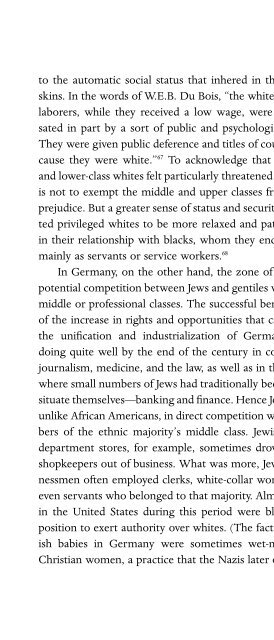Racism - A Short History - George M Fredrickson.pdf - WNLibrary
Racism - A Short History - George M Fredrickson.pdf - WNLibrary
Racism - A Short History - George M Fredrickson.pdf - WNLibrary
Create successful ePaper yourself
Turn your PDF publications into a flip-book with our unique Google optimized e-Paper software.
NOTES to Pages 93–109<br />
78. For a theoretical understanding of this process, see Herbert<br />
Blumer’s seminal essay “Race Prejudice as a Sense of Group<br />
Position,” Pacific Sociological Review 1 (1958): 3–7.<br />
79. See chap. 3 below for a discussion of some of these contingencies.<br />
80. This is the enduring truth that survives from the American<br />
consensus historiography of the 1950s and from the school of<br />
historians who stress German exceptionalism or ein Sonderweg.<br />
The lesson should be that every nation’s history is exceptional, not<br />
that one is peculiar in ways that make it stand out against some abstract<br />
model of normality or typicality.<br />
THREE Climax and Retreat<br />
1. The adjective is necessary because the word “regime” can<br />
be used to describe a prevailing system of domination the basis of<br />
which is implicit or de facto rather than explicit and de jure. I was<br />
tempted to use the concept of “the racial state,” as developed by<br />
Michael Burleigh and Wolfgang Wippermann in The Racial State:<br />
Germany, 1933–1945 (Cambridge, Eng., 1991), but their usage emphasized<br />
some features of the Nazi regime’s practice of “racial hygiene”<br />
that were not replicated in South Africa or the American<br />
South. The Nazis were unique in the extent to which they tried to<br />
improve the quality of the “master race” through the elimination<br />
of its “unfit” members.<br />
2. See John W. Cell, The Highest Stage of White Supremacy: The<br />
Origins of Segregation in South Africa and the American South (Cambridge,<br />
Eng., 1982). But in my view the preapartheid segregation<br />
policy in South Africa did not meet the criteria for a racist regime<br />
as fully as did the Jim Crow system in the American South. Unlike<br />
Cell, I would make a typological distinction between colonialist<br />
and racist regimes. It was not until after 1948 that South Africa<br />
completed its evolution from the former to the latter. A work that<br />
highlights the modern aspect of apartheid is Heribert Adam, Modernizing<br />
Racial Domination: South Africa’s Political Dynamics (Berkeley,<br />
1971).<br />
184
















